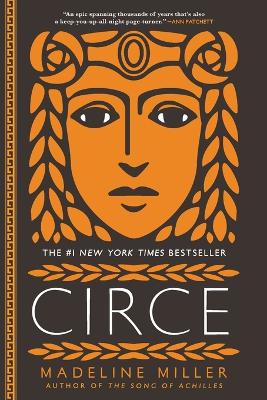Reviewed by jesstheaudiobookworm on
I didn't immediately recall the figure of Circe from my high school studies. Luckily, that didn't impact my experience with this audiobook at all. After Odysseus enters the story, I did remember Circe as the somewhat of an antagonist in The Odyssey. As an eighth grader, I was very much pro-Penelope while reading The Odyssey. Since Circe is presented as one of Odysseus's obstacles in returning to his wife and son, she certainly wasn't a sympathetic figure. However, Madeline Miller changes all that.
Circe is our protagonist here, so we are meant to root for her. Miller makes that increasingly easy as the story progresses. Circe is known throughout history as the goddess of sorcery, but Miller portrays her in a more recognizable light, introducing the label of "witch" to mythology. In fact, if you didn't know you were listening to the story of the goddess of sorcery, Circe could have been one of many wood witches in modern literature. That is not to say that this story was "run-of-the-mill", but that Miller puts a new spin on the story of Circe by combining two recognizable themes: Witchcraft and Divinity.
Circe is both a goddess and a witch. We recognize her as a "nature witch" or "woods witch". Circe's abilities may come from her divinity, but she uses fruits of the earth to channel them. She uses herbs and plants to create elixirs and potions. She communes with wildlife. These things tie her to the earth. Towards the end of the novel, Telemachus quotes his father Odysseus by saying that he had never known a goddess who reveled in her divinity less than Circe. Calling a goddess "down-to-earth" seems ironic, but that is exactly what Circe strives to be and it makes her all the more relatable.
But it was Miller's writing that most brought Circe to life. The story contains one point-of-view, that of Circe. By keeping the story as single point-of-view, it places us in the shoes of Circe, making it easier to connect with her. This was a story that could have easily become a tangled mess. The amount of names and relations bandied about could make your head spin. That was always the most frustrating part of studying Greek mythology. Miller's simplistic, yet beautiful, writing style eases this frustration. The story emits a sort of existentialism. From beginning to end, we cross centuries in time and see generations born and die, all through the same character's eyes. It was a unique experience, for sure. Miller did an excellent job of providing us an immortal's point-of-view, while at the same time presenting Circe with mortal problems (i.e. having a mortal son who can so easily be harmed).
From recent research inspired by the story, I know that Miller omitted certain key aspects of Circe's life, particularly towards the end. I find this interesting because it seems like she took such care to be true to Circe's story before that. It may be that tales of the end of Odysseus's life vary, but in the account I read, Circe plays a large role in the end of Odysseus' and Telemachus' lives. This deviation may be because Miller decided to downplay Circe's abilities as a necromancer. I'm very interested in further looking into the varying accounts of the key players lives.
Circe is a story that I will ponder for years to come. Having just finished it, I can't help but feel that I haven't yet experienced its full impact. The writing was exquisite; the pacing, perfection. I'm now eager to begin The Song of Achilles from the same author. Achilles is a figure I've always felt was over exposed, but I'm now curious to see what Madeline Miller can do with him.
Narration review: Perdita Weeks may possess one of the most chillingly beautiful voices I've ever heard. During this performance, I forgot that I was listening to an audiobook narrated by Perdita Weeks. Weeks became Circe and Circe was divulging the details of her life to me. Weeks slipped into the body of the character like slipping on a glove and told the story with Circe's voice. I can't recall a more perfect casting than Perdita Weeks as Circe. While listening to the audiobook, I could almost see Circe as well as hear her. The beauty in Weeks' voice stunned me almost as much as that of Miller's writing. The two combined to provide me with an memorably explicit listening experience. ♣︎
Reading updates
- Started reading
- 4 March, 2019: Finished reading
- 4 March, 2019: Reviewed
